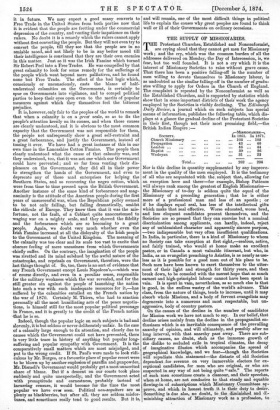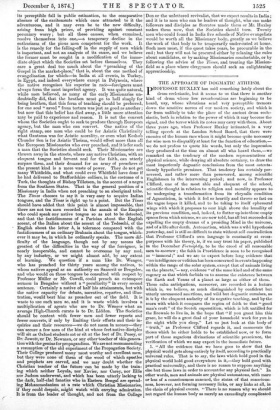Tab SUPPLY OF MISSIONARIES.
THE Protestant Churches, Established and Nonconformist, are crying aloud that they cannot get men for Missionary work ; and the cry, which was the common burden of all the addresses delivered on Monday,- the Day of Intercession, is, we fear, but too well founded. It is not a cry which it is the interest of Missionary Societies to raise without grave cause. That there has been a positive falling-off in the number of men willing to devote themselves to Missionary labour, is as undoubted as the similar falling-off in the number of gradu- ates willing to apply for Orders in the Church of England. The complaint is repeated by the Nonconformist as well as the Established Churches, and is supported by statistics which show that in some important districts of their work the agency employed by the Societies is visibly declining. The Edinburgh Daily Review, a journal which on such subjects has special means of information, publishes the following table, which dis- plays at a glance the gradual decline of the Protestant Societies in their first, though hot their most promising field,—the British Indian Empire :- SOCIETY. f—MirsszonnuEs--,
In 1861. In 1871.
Church Missionary
... 103 ... 102 Propagation ...
... 43 ... 40 London ...
... 46 ... 44 Baptist ...
... 39 ... 26 Wesleyan
• • • • •
... 31 ... 22
Total... 262 ... 234
Nor is this decline in quantity supplemented by any improve- ment in the quality of the men employed. It is the testimony of all who are acquainted with the, subject that, allowing for an exception here and there—for example Bishop Patteson will always rank among the greatest of English Missionaries— the Missionary of to-day is seldom quite the equal of the Missionary of a preceding generation ; that he is either more of a professional man and less of an apostle ; or if he displays equal zeal, has less of the intellectual gifts which make that zeal effective. Worse educated, worse bred, and less eloquent candidates present themselves, and the Societies are so pressed that they can exercise but a nominal discrimination among applicants, can hardly, indeed, reject any of unblemished character and apparently sincere purPose, —two indispensable but very often insufficient qualifications. In India, in particular, there is a kind of Missionary to whom no Society can take exception at first sight,—zealous, active, and fairly trained, who would at home make an excellent pastor, or in Canada a most valuable itinerant, but who, in India, as an evangelist preaching to Asiatics, is as nearly as use- less as it is possible for a good man out of his place to be. Such men have been known to exert themselves to the utter- most of their light and strength for thirty years, and then break down, to be consoled with the merest hope that so much earnest and high-principled labour cannot have been spent in vain. It is spent in vain, nevertheless, as so much else is that is good, in the endless wastry of the world's advance. This class, from the nature of things, tends to increase, until it may absorb whole Missions, and a body of fervent evangelists may degenerate into a numerous and most respectable, but un- aggressive, body of country pastors. On the causes of the decline in the number of candidates for Mission work we have not much to say. In our belief, that decline arises mainly from the decline in the propagandist en- thusiasm which is an inevitable consequence of the prevailing anarchy of opinion, and will ultimately, and possibly after no long interval, with that anarchy pass away. There are sub- sidiary causes, no doubt, stich as the immense growth of the dislike to secluded exile in tropical climates, the decay of imaginative illusion which accompanies the spread of geographical knowledge, and we fear—though the Societies will repudiate this statement—the distaste of old Societies dependent for revenue on very immovable electors for ex- ceptional candidates, for men who are original, or who are suspected in any way of not being quite "safe." The reports of such men sometimes create a clamour, and their speeches, when at home, are not conducive to that steady and equable flowing-in of subscriptions which Missionary Committees ar- prove, and which in honest truth it is their duty to desire. Something is due also, no doubt, to the diminished and di- minishing attraction of Missionary work as a profession, to its perceptible fall in public estimation, to the comparative absence of the excitements which once attracted to it the adventurous, and it may even be to the new difficulty, arising from high prices, of providing against constant pecuniary worry ; but all these causes, when examined, resolve themselves into one,—a temporary decline in the enthusiasm of the pious men competent for the work. It is the remedy for the falling-off in the supply of men which is important, and not an analysis of its cause, and we believe the former must be sought in a modification of the imme- diate object which the Societies set before themselves. They care a great deal too much about the "preaching of the Gospel in the market-place," that is, about the one method of evangelisation for which—in India at all events, in Turkey, in Egypt, and indeed everywhere except in Polynesia, where the native recognises his superior in rade—foreigners must, always form the most imperfect agency. It was quite natural, while men believed, as many of the early Missionaries un- doubtedly did, that the heathen must go to hell simply for being heathen, that this form of teaching should be preferred, for one soul " saved " from torture was just as good as another ; but now that this belief has died away, a little more attention may be paid to experience and reason. It is not the convert whom the Societies ought to seek to produce through European agency, but the man who can convert. One native of the right stamp, one man who could be for Asiatic Christianity what Gautama was for Asiatic morality, or even what Keshub Chnnder Sen is for Asiatic Theism, would effect more than all the European Missionaries who ever preached, and it is for such a man that the Societies should seek. Their Missionaries are thrown away in the streets, where any native Christian, with an eloquent tongue and fervent zeal for the faith, can utterly surpass them, and their demand for an army of preachers of the present kind is a mere waste of power. They do not get many Whitfields, and what could even Whitfield have clone if he had delivered to Staffordshire colliers, in the costume of a Turk, the thoughts of Bishop Tillotson, in the accent of a negro from the Southern States. That is the general position of a Missionary in India when not preaching to an aboriginal tribe. The Times chooses to say it is very easy to acquire Indian tongues, and the Times is right up to a point. But the Times should have added that this point is almost impassable, that there are not ten men recorded in the annals of the Empire. who could speak any native tongue so as not to be detected, and that the fastidiousness of a Parisian about the English accent, of the Italian about the accent of the Tedeschi, of the - English about the letter h, is tolerance compared with the fastidiousness of an ordinary Brahmin about the tongue, which- ever it may be, in which he ordinarily speaks. The mere dif- ficulty of the language, though not by any means the greatest of the difficulties in the way of the foreigner, is nearly insuperable, and cannot be overcome by any zeal, by any industry, or we might almost add, by any extent of learning. We question if a man like Dr. Wenger, who has preached for thirty years among the natives, to whom natives appeal as an authority on Sanscrit or Bengalee, and who would on those tongues be consulted with respect by Professor Milner or Mr. Cowell, could preach an extempore sermon in Bengalee without a " peculiarity " in every second sentence. Certainly a native of half his attainments, but with the native capacity for debate, narrative, repartee, and illus- tration, would beat him as preacher out of the field. It is waste to use such men so, and it is waste which involves a multiplication of agents who are to Dr. Wenger what an average High-Church curate is to Dr. Liddon. The Societies should be content with fewer men and fewer reports and fewer converts, if only by limiting their efforts and their in- quiries and their resources—we do not mean in money—they can secure a few men of the kind at whose feet native disciples will sit as Oxford students sat or sit at the feet of Dr. Pusey, or Dr. Jowett, or Dr. Newman, or any other teacher of this genera- tion with the genius for propagandism. We are not recommending a resumption of the old experiment of the Propagation Society. Their College produced many most worthy and excellent men, but they were none of them of the wood of which apostles and prophets are carved, and we may doubt whether the Christian teacher of the future can be made by the train- ing which neither Loyola, nor Xavier, nor Carey, nor Ellis nor Judson underwent, and which has been utterly lacking to the dark, half-clad fanatics who in Eastern Bengal are spread- ing Mohammedanism at a rate which Christian Missionaries, if they could despair, might watch with envying admiration. It is from the leader of thought, and not from the College Don or the unlettered revivalist, that we expect results in India ; and it is to men who can be leaders of thought, who can make followers and disciples as Socrates made them or Mr. Huxley makes them now, that the Societies should turn. Twenty men who could found in India five schools of Native evangelists would be worth all the Missionary body, greatly as we believe the work of that body to be temporarily under-rated at home. Such men must, if the quest takes years, be procurable in the end ; but they will not be procured either by relaxing the rules about candidates or by making Missionaries comfortable, or by following the advice of the Timm, and treating the Mission- field as a place where clergymen should seek an enlightening apprenticeship.



































 Previous page
Previous page